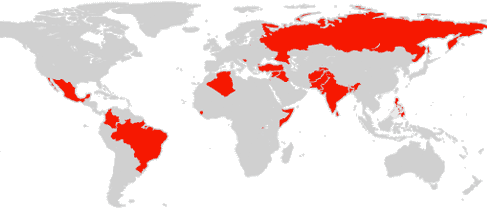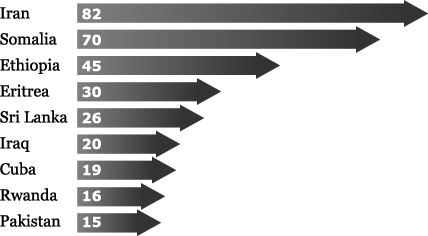For the second year in a row, CPJ ranked Syria the deadliest country in the world for journalists. Journalists also faced new threats in 2013 as radical Islamist groups strengthened their influence in rebel-held territory and rebel groups saw increased infighting. An unprecedented number of journalists were abducted during the year; many of them were believed to be held by the Al-Qaeda affiliate Islamic State of Iraq and Sham. But the blame did not fall solely with extremist groups. Armed factions affiliated with both the regime and the rebels were implicated in anti-press violations including detention and killing. Throughout the year, as the groups succeeded in silencing dissenting voices with complete impunity, fewer journalists were willing to take on the risks of reporting from Syria. Many international journalists refused to enter the country, and local journalists fled into exile, fearing for their lives.
Syria
» Syria is the deadliest country for the press for second consecutive year.
» More journalists are missing in Syria than in any other country in the world.
For the second year in a row, CPJ ranked Syria the deadliest country in the world for journalists. Journalists also faced new threats in 2013 as radical Islamist groups strengthened their influence in rebel-held territory and rebel groups saw increased infighting. An unprecedented number of journalists were abducted during the year; many of them were believed to be held by the Al-Qaeda affiliate Islamic State of Iraq and Sham. But the blame did not fall solely with extremist groups. Armed factions affiliated with both the regime and the rebels were implicated in anti-press violations including detention and killing. Throughout the year, as the groups succeeded in silencing dissenting voices with complete impunity, fewer journalists were willing to take on the risks of reporting from Syria. Many international journalists refused to enter the country, and local journalists fled into exile, fearing for their lives.
At least 61 local and international journalists were abducted in 2013 by various sides of the conflict, including government or pro-government militias; rebel or rebel-affiliated groups; and non-Syrian Islamic extremist groups, according to CPJ research. In 2012, CPJ documented at least 23 abductions of local and international journalists.
Some of the journalists have since escaped or been released, but approximately 30 journalists remained missing in Syria at the end of 2013. Some of them are believed to be held by the Al-Qaeda affiliate Islamic State of Iraq and Sham (ISIS).Javier Espinosa and Ricardo García Vilanova
Espinosa, a correspondent for the Spanish daily El Mundo, and García Vilanova, an award-winning freelance photographer, were abducted by armed men at a checkpoint near Tal-Abyad in northern Syria on September 16, according to their families. They were taken to a detention facility run by ISIS in Raqqa. The journalists' families, which initially did not publicize the case, said ISIS had refused to negotiate for the men's release or explain why they were being held.Rami al-Razzouk
The journalist for the local opposition news outlet Radio ANA was abducted by ISIS gunmen during a raid on the station on October 1, the station reported. The gunmen raided the station again on October 15, confiscating its radio and communications equipment. The station said ISIS was "targeting the newborn independent Syrian press in a deliberate strategy to crush press freedom and to impose a renewed and constant censorship upon the Syrian people."Syria was the deadliest country in the world for journalists this year, with at least 29 local and international journalists killed for their coverage of the conflict. The number includes French freelance photojournalist Olivier Voisin, who was injured in Syria and succumbed to his wounds in Turkey in February.

| 1. Iraq: 161 2. Philippines: 76 3. Syria: 61 4. Algeria: 60 5. Russia: 56 6. Pakistan: 53 7. Somalia: 52 | 8. Colombia: 45 9. India: 32 10. Mexico: 29 11. Brazil: 27 12. Afghanistan: 24 13. Turkey: 21 14. Sri Lanka: 19 | 15. Bosnia: 19 16. Rwanda: 17 17. Tajikistan: 17 18. Sierra Leone: 16 19. Bangladesh: 14 20. Israel and the Occupied Palestinian Territory: 12 |
CPJ's worldwide census, conducted on December 1, documented a slight decrease from last year in the number of journalists detained by the government.
One journalist, Abdul Raheem Kour Hassan, director of broadcasting for the local opposition station Watan FM, died while being held at Palestine Branch, a feared prison of Syria's Military Intelligence Security, which is known for its severe abuse of prisoners, Watan FM said.
Since the start of the conflict in 2011, more than 70 Syrian journalists have fled into exile, according to CPJ research.
This mass exodus of journalists mirrors the vast Syrian refugee crisis, with an estimated 40 percent of the Syrian population displaced from their homes. Though reasons for fleeing into exile vary, the results are universal: Exiled journalists are subject to fear, poverty, and uncertainty, while conditions for free expression deteriorate in the countries they leave behind, according to CPJ's annual exile report.

